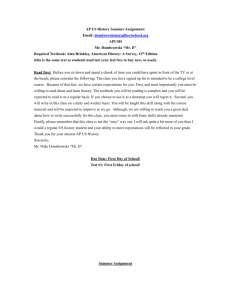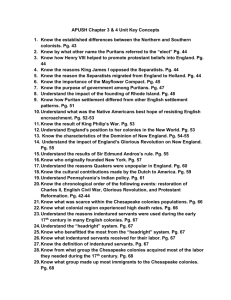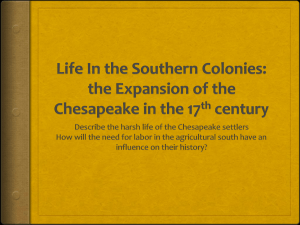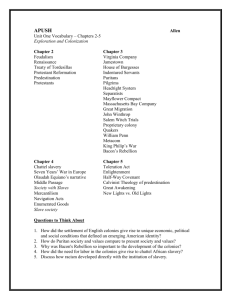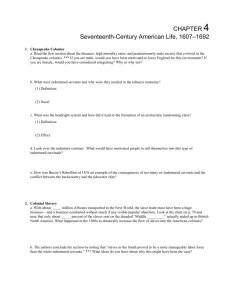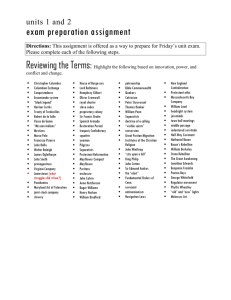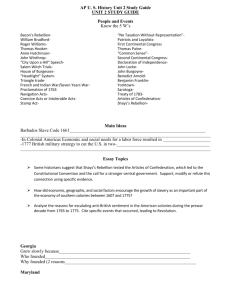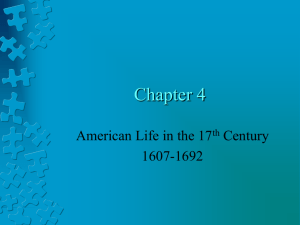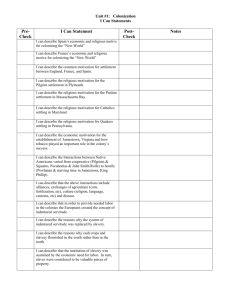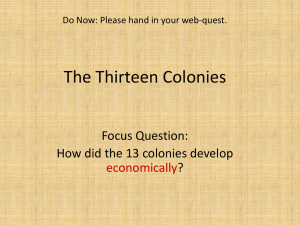New England Colonies
advertisement
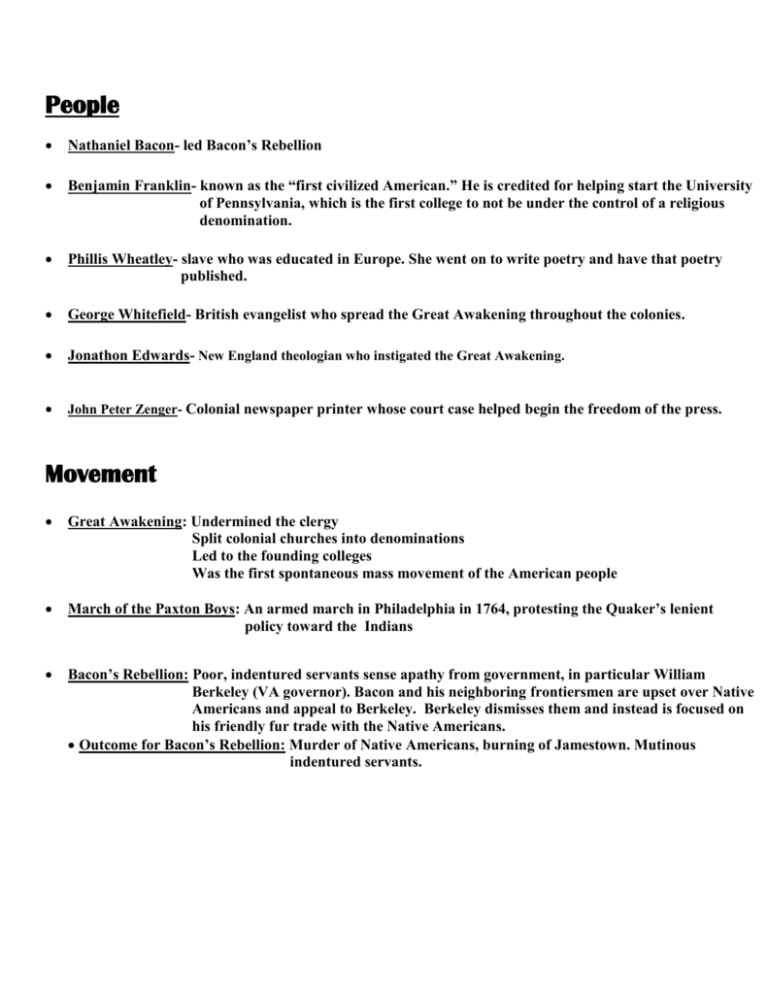
People Nathaniel Bacon- led Bacon’s Rebellion Benjamin Franklin- known as the “first civilized American.” He is credited for helping start the University of Pennsylvania, which is the first college to not be under the control of a religious denomination. Phillis Wheatley- slave who was educated in Europe. She went on to write poetry and have that poetry published. George Whitefield- British evangelist who spread the Great Awakening throughout the colonies. Jonathon Edwards- New England theologian who instigated the Great Awakening. John Peter Zenger- Colonial newspaper printer whose court case helped begin the freedom of the press. Movement Great Awakening: Undermined the clergy Split colonial churches into denominations Led to the founding colleges Was the first spontaneous mass movement of the American people March of the Paxton Boys: An armed march in Philadelphia in 1764, protesting the Quaker’s lenient policy toward the Indians Bacon’s Rebellion: Poor, indentured servants sense apathy from government, in particular William Berkeley (VA governor). Bacon and his neighboring frontiersmen are upset over Native Americans and appeal to Berkeley. Berkeley dismisses them and instead is focused on his friendly fur trade with the Native Americans. Outcome for Bacon’s Rebellion: Murder of Native Americans, burning of Jamestown. Mutinous indentured servants. Indentured Servitude Headright system- popular in Virginia. Merchant-planters were given 50 acres for each indentured servant they paid passage for. Decline- Wages rose in Europe, which eliminated a push factor. Created a 6:1 ratio of men to women in southern colonies, particularly Maryland and Virginia. Slavery Triangular Trade- Shipment of slaves, rum, and molasses. Locations involved are West Indies, Europe, and West Africa. Increase of slavery in American colonies- indentured servants were making higher wages in Europe, and Native Americans died easily from disease. Though more costly than the previously mentioned two groups, African slavery increased. Distinct African-American culture- Gullah, bongo drum, banjo, jazz Captured by West Africa coastal tribes and sold to European slave merchants. A more “manageable labor force.” New England Colonies Women- started having children in late teens, early twenties, on average had a child every two years until they went through menopause. Communities and towns added an elementary school when population reached a minimum of 50 families. Economy depended on the following commodities: lumber, fishing, shipbuilding, commerce. Salem Witch Trials- mostly property owning women accused of witchcraft. Middle Colonies Germans settling in Pennsylvania Scots-Irish setting in the backwoods of the Appalachians, not from Ireland, Scottish Presbyterians Two non-English white immigrant groups Southern Colonies 6:1 ratio of men to women in southern colonies, particularly Maryland and Virginia. Women retained ownership of property since husbands within 7 years of marriage. Largest group was small farmers. Social classes: Merchant-planters, small farmers, indentured servants, slaves Church Congregational and Anglican (Church of England)-both established or tax supported. Denominations Puritan system of congregational church government led naturally to democracy in political government. Half-Way Covenant-baptism, but not full membership for children of members. Most highly regarded profession was the clergy. Colonial-British Relations Strained due to colonists trading with French West Indies Molasses Act in 1733 attempted to end trade but led to colonial smuggling. Colonial governors were mostly appointed by the king or monarchy. Colonists controlled most royal governors by withholding their salaries. Misc. Average age of colonists in 1775 was 16. 90% of colonies relied on agriculture for their livelihood. Taverns served as a place where all social classes (exception is slaves) could talk news and politics. Short Answer: I will place ONE of the following on the test. You do not know which one I will chose so make sure you can answer any of the three. 1. Write your definition of democracy. Then use this definition to argue that colonial politics had or had not become democratic by 1760. 2. Assess the extent to which the Great Awakening, an intensely religious movement, contributed to the development of the separation of church and state in America. 3. Could the colonies’ labor problem have been solved without slavery?
